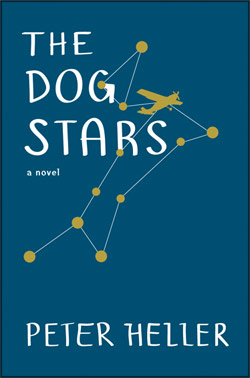Upon hearing a synopsis of The Dog Stars by Peter Heller, you might think it has much more in common with The Road by Cormac McCarthy than it actually does: lone man, accompanied only by trusted companion (dog/young son, respectively) navigates terrifying world decimated (is there a word for 1/100? centimated?) by global plague, searching for humanity in a kill-or-be-killed landscape of violence and fear.
But I assure you that The Road is so much unlike The Dog Stars that you should not allow your feelings about that text to impact whether or not you pick up this one. Which is to say: read this if you liked The Road. But especially read it if you didn't.
First of all, can I just say, Peter Heller is a badass. His blog touts him as the "award-winning adventure writer," and, I mean, this guy rode with Whale Wars. And wrote a book about it. He's the real deal.
But it is precisely Heller's hard-won credentials that make the tenderness of his narrator so startling and so authentic.
Our noble and humble hero Hig, accompanied by his noble and humble man's-best-friend Jasper, live in Colorado after a flu wipes out basically the entire human race. Hig's only form of back-up is a solid one: Bruce Bangley, ex-military with an extremely impressive arsenal. Hig flies a 1956 Cessna 182, "really a beaut" he boasts on page 4, scouting the beautiful and empty landscape for signs of humanity. Not just humans. Humanity.
Hig also likes to fish, and he and Bangley get into a bunch of fire-fights, which I pretty much skimmed (like all fight scenes I read, generally) but if you're a boy, you'll probably like them. And during the fight things he says stuff like this:
Heart thumping, but it was the almost happy anxious thump I remembered from playing soccer in high school. I was a goalie, the last stop, the last resort...Once it started it was all action, no thought, and the joy pushed up through the fear.
I've never played goalie, but I know that happy anxious thump. We all do.
And I'm no expert, but I don't really think it's the fight scenes that make this book. Though, if you love fight scenes, please weigh in. Instead, it's the beautifully clipped emotion of Heller's voice. A lot of reviews compare him to Hemingway, but as I see it, Jake Barnes is way more repressed, thwarted, and, you know, impotent, than this guy.
Heller's narrative exemplifies the kind of male voice I want my students to read. It's authentic, honest, emotional, moving, and not ashamed to be attached to things, people, dogs, feelings. Hig needs connection in his life, and he seeks it without compromising even the tiniest fragment of his manhood.
And, amazingly, he finds what's he's looking for, which is more than a little bit unbelievable. But I accepted it, because I liked him so darn much, that I thought, gosh-darn-it, he deserves the sexy beautiful soulmate he happens to find on his quest. (And it really isn't exactly that simple.)
I am interested in our persistent infatuation with apocalyptic and post-apocalyptic fiction, and I feel that because of the ubiquity of the genre, a review of this type of book may get lost in the shuffle.
But I recommend this story not because it feels like one of those stories, but exactly because it doesn't. Hig's connections, with Jasper, with the land, are real, and so is his desire to preserve, and not only preserve, but actively seek those links even when things seem hopeless.
A worthy goal.
Sunday, March 17, 2013
Thursday, March 14, 2013
Next Reads

I've been a terrible reader, lately. The truth is, I more often am (a terrible reader) than not. But it's spring break, and here are two books at the top of my list.
Vampires in the Lemon Grove by Karen Russell
I'll admit. I didn't love Swamplandia! And I rarely pick up short story collections, so I wrote this one off pretty quickly. But the always-wise Maureen Corrigan loved it. When she described "Proving Up" as "Willa Cather crossed with Emily Dickinson in her Gothic mood" and argued that it "is a stark tale about the American Frontier and the payment — in sanity and mortality — that the land demanded from the settlers," I was completely won over. Book Riot also loved it, giving "Proving Up" the admittedly unattainable A-triple-plus.
The Round House by Louise Erdrich
Erdrich is one of my absolute favorite authors. If you haven't discovered her, start with Tracks, and then pick up The Last Report on the Miracles at Little No Horse. (With a title like that, how can you go wrong?) I had The Round House in the back of my mind, but Love Medicine didn't totally win me over, so I wasn't convinced.
But then, when Dead White Guys called it "an unexpected whodunit page turner!" I decided it was definitely time to revisit Erdrich. After an admittedly slow reading season, it sounds like exactly the thing to help me start back up.
Subscribe to:
Posts (Atom)

